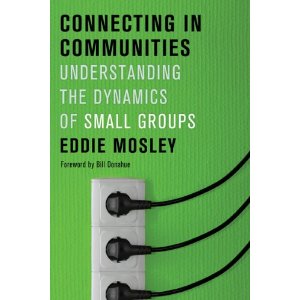
I just finished reading a great book by Eddie Mosely entitled Connecting in Communities: Understanding the Dynamics of Small Groups . Eddie is a practitioner who has helped his church, LifePoint Church, which had Sunday School to transition into a church of small groups. Through experience, Eddie has come to believe that small groups are “crucial to bringing about sustainable life change.” Eddie shares his journey in an honest and transparent way. He has been a learner who has been a learner who has led in making adjustments as needed along the way.
There are many things I like about Eddie’s book. His personal illustrations are great. They share about decisions made, bumps encountered, adjustments made, and a process that is producing results in changed lives. Eddie also shares some comments and experiences of others with whom he has consulted.
His three-prong emphasis on discipleship, community, and service makes much sense and is so adaptable. I really enjoyed his two sets of questions at the end of each chapter focused on the small group ministry leader and on the small group leader. They could easily form great conversation for making the right decisions in any context. Eddie would discourage adopting his process wholesale. Instead, he would encourage leaders to do the hard but important work of asking the right questions to create ownership and effectiveness in that setting.
Here are Eddie’s seven chapters:
- Small Groups Impact Communities
- What Do I Do First?
- Pragmatic Strategy (Organization)
- Adapt, Don’t Adopt (Assimilation)
- Sharper Than You Think (Leadership Development)
- Higher Thinking, Now (Curriculum Choices)
- Now What? (Developing Issues in Small-Group Ministry)
The book’s appendix also has several helpful pieces: (1) a sample calendar for adding small groups to your current structure; (2) LifePoint’s core values and characteristics of a disciple; (3) sample small group covenant with emphasis on discipleship, community, and service; (4) small-group info card; (5) explanation of Fielder’s Choice designed to capitalize on resources and interests in your congregation to launch groups; (6) expectations of a small-group host, host interview questions, and small-group leader expectations; (7) how to host a neighborhood Easter egg hunt; and (8) a great suggested reading list.
Because there are so many specific things to share from this great book, I will stop my review here and add others posts focusing on specific issues raised. I encourage you to secure a copy of Connecting in Communities: Understanding the Dynamics of Small Groups. It is an easy but important read (1) for those considering doing small groups, (2) for those desiring to strengthening their small-group ministry, and (3) for Sunday School leaders who can gain many great ideas for even stronger Sunday School work.
Pray. Discuss. Start small. Coach. Enlarge. Make disciples. Be revolutionary!
Leave a Reply